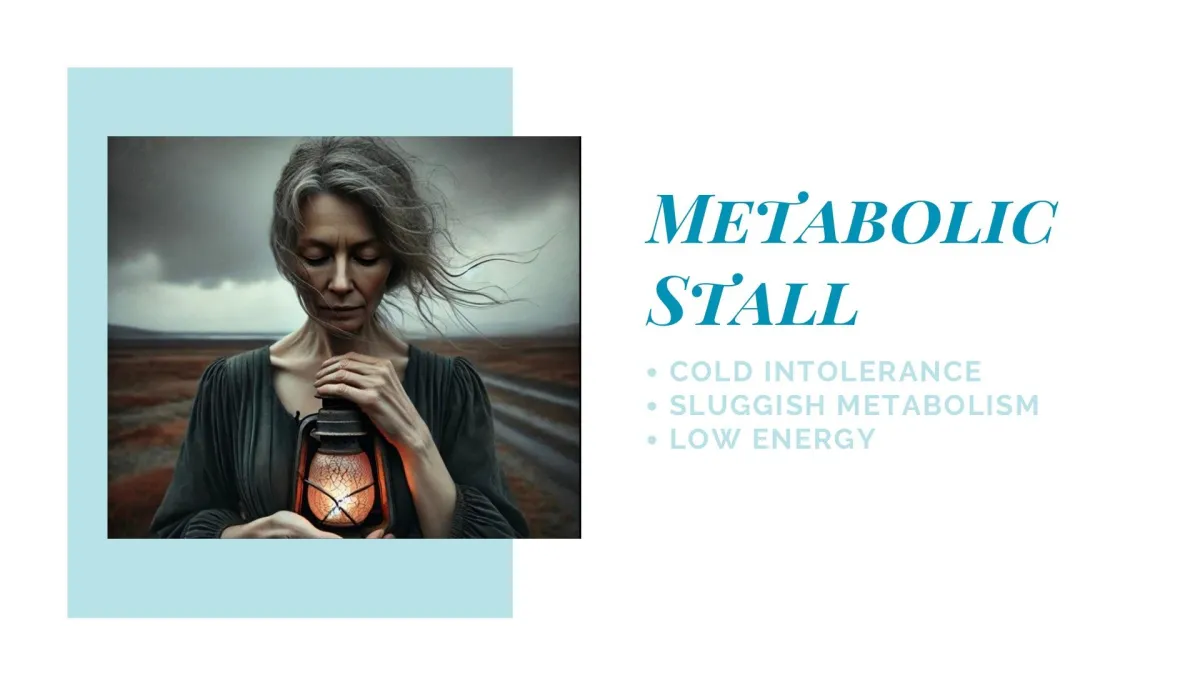
Metabolic Stall: When Your Body’s Engine Feels Stuck
If it feels like your metabolism has hit a wall—despite eating well, exercising, and doing all the “right” things—you’re not imagining it. Metabolic Stall is exactly what it sounds like: your body’s engine has slowed, and the usual strategies just aren’t working anymore.
You may feel like your efforts aren’t giving you the results they used to. The weight won’t budge (especially around your midsection), your digestion feels slower, and your energy isn’t what it used to be. You’re not doing anything “wrong”—your body’s needs have simply changed.
What’s Really Going On?
As hormone levels shift during perimenopause and menopause, insulin sensitivity often decreases and thyroid function can be impacted—two of the biggest players in your metabolic health. Add in stress, poor sleep, or restrictive dieting over the years, and your body begins to prioritize conservation over fat burning.
Your system may be trying to protect you—but that protection can feel like resistance.
It’s not that your metabolism is broken. It’s simply responding to your internal environment—and asking for a new kind of support.
What if You’re In Perimenopause?
This pattern often begins in mid to late perimenopause, when fluctuating estrogen and dropping progesterone start to impact insulin and thyroid function. You might notice it’s harder to maintain your weight, your digestion slows, or your workouts don’t give you the same results. These are early signs your metabolism is shifting. Starting support now can help you avoid the deeper stall many women experience later on.
But What If You’re Already Postmenopausal?
Metabolic Stall is especially common in postmenopause, when estrogen (which once helped keep insulin and thyroid in check) has significantly declined.
This change can cause slower digestion, more difficulty building or maintaining muscle, increased fat storage around the belly, and a heightened stress response to dieting or overexercising.
What worked in your 30s and 40s may no longer be effective—or even appropriate. Your body has a new operating system now, and it needs a new strategy to match.

Symptoms You Might Be Dealing With
Stubborn weight gain, especially around the belly
Slower digestion or mild constipation
Cravings for sugar or carbs
Cold hands and feet or feeling colder overall
Low motivation to exercise or feeling worse after
Low energy despite resting
Frustration with plateauing, even while being “good”
Why This Matters
When your metabolism slows down, it’s not just about weight—it’s about energy, hormone balance, blood sugar regulation, and even brain clarity. And unfortunately, doing more (stricter diets, longer workouts) often backfires and makes things worse.
What your body needs isn’t more pressure—it’s a smarter, more supportive approach that honors your current phase of life.
What You Can Do About It
You can absolutely get your metabolism moving again—with the right plan. One that supports your hormones, rebuilds muscle, improves insulin sensitivity, and reduces inflammation.
While general advice like adjusting your diet or increasing exercise might offer temporary relief, these solutions often don’t address the root causes unique to your body’s current state.
That’s where the Menopause Playbook program comes in. It’s not just another generic guide; it’s a personalized roadmap designed to help you understand and manage your unique hormonal landscape. With expert guidance, tailored strategies, and a supportive community, you’ll have the tools you need to regain control and feel like yourself again.
Don’t let a metabolic stall dictate your life. Take the first step towards balance and well-being
Want a Clearer Path Forward?
If you’re stuck in the cycle of doing more but getting less, I invite you to join me inside My Menopause Playbook.
It’s a 4-month group coaching program that helps you understand your unique hormone and metabolism patterns—and shows you how to move forward with confidence. Inside, you’ll get a realistic, sustainable plan to support fat loss, build strength, boost energy, and feel at home in your body again.
You’ll be guided step by step, with support from other women who are right there with you—and expert coaching to keep you moving forward.
And yes—it’s a 4-month commitment. But think about this: how long have you been spinning your wheels trying to fix this? And how long might it continue if nothing changes?
This is your chance to reset, rebuild, and finally feel momentum again.